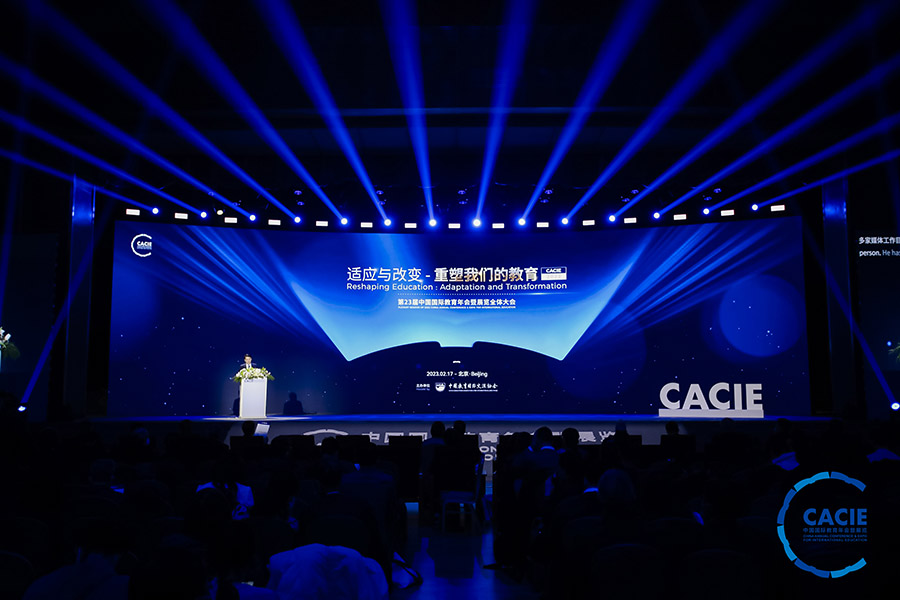Educators and scholars hold forum to discuss directions and goals of education amid global changes
Held under the theme of “Reshaping Education: Adaption and Transformation”, the Plenary Session of the 23rd China Annual Conference & Expo for International Education (CACIE) was held both online and offline at the Beijing International Conference Center on February 17, 2023.
Hosted by the China Education Association for International Exchange, the event drew educators, scholars, and representatives from different universities, institutions, and academia together to discuss the current situation as well as future development of education.

Photo taken on Feb. 17, 2023 shows people attending the Plenary Session of China Annual Conference and Expo for International Education at Beijing International Conference Center (Photo provided by China Education Association for International Exchange)
Huai Jinpeng, China’s Minister of Education, delivered an opening speech via video. Noting that China has made “a historical leap in education popularization over the past decade,” Huai stressed that the country will continue to prioritize developing education, promote all-round human development, persist in continuous innovation and reform, adhere to high-level opening-up, as well as accelerate the modernization of education and build a powerful nation of education.
Huai pointed out that win-win cooperation has always been the primary driver of development. He proposed enhancing cooperation under the framework of a multilateral mechanism to promote common development in education and comprehensively deepening digital education cooperation to promote education modernization. He also urged the improvement of cross-cultural communication skills to enhance mutual understanding and friendship, which will promote the construction of a more open and inclusive world.
Dr. Patricia Flor, Ambassador of Germany to China, said in her speech that the year 2022 marked the 50th anniversary of the China-Germany diplomatic relationship, and “numerous exchanges and cooperation between universities and institutions have been witnessed between the two countries”. As the country of honor at the event, “Germany has been, still is, and will be one of the solid partners with China in the future in all phases, especially in terms of education,” said Flor.
Scholars and representatives from universities also shared their views on education and innovation. Wang Shuguo, President of Xi’an Jiaotong University, pointed out in his speech that the world is currently standing at a crossroads and facing major changes unseen in a century, while emerging new technologies are bringing huge impacts on education today.
“Therefore, the functions of universities and schools should switch from merely teaching knowledge to innovating the knowledge system, because the ultimate goal of universities is to serve the development of society,” said Wang.
Wang also pointed out in a subsequent interview with People’s Daily Online that another goal for enhancing international educational cooperation is the building of a community of a shared future for mankind. “We all live on this same planet. Therefore, we need to create a better future for our future generations, and education is a powerful tool for them to alleviate misunderstanding and create mutual understanding and friendship.”
Liu Ningrong, Associate Vice President of the University of Hong Kong, analyzed the impact of digital technology on education. “With the help of the internet, teachers are not merely serving as knowledge providers in the classroom. Instead, they are leading students to form their own thoughts because the internet has changed students’ cognitive style and helped them know themselves better,” he said.
On the other hand, Liu also admitted that advances in technology have also brought some challenges to education. “The fragmentation of knowledge has prevented students from acquiring the real knowledge that they need,” said Liu. “In addition, misinformation has also affected students’ judgement of the accuracy and authenticity of the real information they are seeking, so we as educators should have a clear mind as to what type of information we want our students to acquire.”
All the participants reached the consensus that globalization is still the major trend of world development amid uncertainties such as the COVID-19 pandemic and geopolitical crises. Enhancing international exchanges could allow China and the rest of the world to better understand each other by learning the strengths in their respective education systems.
Photos
Related Stories
- Digital transformation driving progress in education
- Chinese vice premier urges efforts to launch more high-quality digital education services, products
- Importance of education promoted in Xinjiang
- Hong Kong signs MOU with Pakistan on education cooperation
- Michael O’Sullivan: Education reflects the culture it is based on
Copyright © 2023 People's Daily Online. All Rights Reserved.









